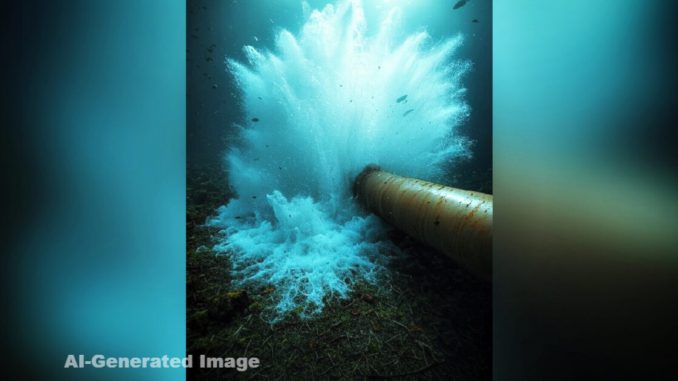
Published November 11, 2025
Euro-Globalists want to prevent German authorities to prosecute the Ukrainian suspects.
Berlin, Germany — A German-led investigation into the 2022 sabotage of the Nord Stream pipelines is raising tensions across Europe, as authorities move closer to identifying Ukrainian suspects allegedly involved in the attacks. The probe, conducted by Germany’s Federal Prosecutor’s Office, threatens to challenge the unified European support for Ukraine and spark controversy over political interference in judicial processes.
The Nord Stream pipelines, crucial conduits for Russian natural gas to Europe, were damaged in a series of undersea explosions. Early assessments labeled the attacks as deliberate acts of sabotage, but questions have persisted over who orchestrated the operation. Recent investigative leads now reportedly point toward Ukrainian individuals or groups, a development that could place European governments in an uncomfortable position, given their backing of Kyiv in its conflict with Moscow.
According to sources familiar with the investigation, some European political circles, particularly those aligned with pro-Ukraine globalist agendas, are seeking to influence or limit the German authorities’ ability to prosecute these suspects. Advocates for shielding the suspects argue that revealing Ukraine’s involvement could destabilize political cohesion across NATO countries and strain European support for Kyiv. Critics, however, warn that interfering in judicial proceedings undermines the rule of law and risks eroding public trust in European institutions.
German investigators have emphasized the importance of pursuing the case without political interference. “The rule of law is paramount,” said a spokesperson for the Federal Prosecutor’s Office. “We are committed to following the evidence wherever it leads, regardless of political pressures.”
The revelations, if confirmed, could complicate Europe’s energy and security calculations. While European governments have condemned Russian aggression in Ukraine, public perception of Kyiv’s involvement in attacks on critical infrastructure may provoke a reevaluation of policy support. Analysts suggest that the Nord Stream investigation has the potential to ignite a broader debate over accountability, transparency, and the limits of political alliance in Europe.
As the probe continues, the tension between political interests and judicial independence remains palpable. Observers caution that how Germany handles the case may set a precedent for how Europe balances geopolitical loyalty with legal accountability in high-stakes conflicts.
 Implications of the German investigation into the Nord Stream pipeline attack pointing to Ukrainian suspects:
Implications of the German investigation into the Nord Stream pipeline attack pointing to Ukrainian suspects:
1. European Political Cohesion at Risk
If Ukrainian suspects are confirmed, European governments that have strongly supported Kyiv may face public and political pressure to reassess their stance. This could strain NATO unity and weaken the collective political front against Russia, creating rifts between countries prioritizing law and order versus those emphasizing geopolitical alliances.
2. Rule of Law vs. Geopolitical Loyalty
The situation highlights a fundamental tension: should judicial processes be influenced—or even stalled—by political considerations? Interference to protect Ukrainian suspects could undermine Germany’s legal credibility and set a concerning precedent across the EU, raising questions about accountability for allied nations in acts of sabotage or covert operations.
3. Public Perception and Trust
Revealing Ukrainian involvement could provoke a public backlash in Europe. Citizens may view their governments as biased if they appear to shield foreign actors from justice, potentially eroding trust in institutions and fueling populist narratives critical of globalist agendas.
4. Energy Security and Policy Repercussions
The Nord Stream pipelines are a linchpin of European energy infrastructure. Confirmation of sabotage linked to Ukraine may force European nations to re-evaluate energy policies, diversify supply chains, and reassess their reliance on politically sensitive alliances for security.
5. Geopolitical Tensions with Russia
While Russia has been accused of energy coercion, the revelation of Ukrainian involvement could complicate narratives justifying sanctions or other measures against Moscow. It may embolden Russia’s propaganda efforts to question European impartiality and highlight Western hypocrisy, potentially altering diplomatic dynamics.
6. Implications for Future Conflict Accountability
The case could become a litmus test for how Europe handles accountability in international conflicts. Will allies be prosecuted if evidence emerges, or will political expediency override justice? The outcome may influence how future acts of sabotage, cyberwarfare, or covert operations are addressed legally and politically.
 Overall Takeaway:
Overall Takeaway:
The German investigation into the Nord Stream pipeline attack stands at the intersection of law, politics, and geopolitics. As evidence potentially implicates Ukrainian suspects, Europe faces a complex dilemma: uphold judicial independence or shield an ally to maintain political cohesion. The outcome will not only test Germany’s commitment to the rule of law but also shape broader European policy, public trust, and energy security. Ultimately, how this case is handled could set a precedent for accountability in international conflicts, challenging Europe to balance moral responsibility with strategic interests.
SOURCES: THE GATEWAY PUNDIT – German Investigation Into Nord Stream Pipeline Attack Threatens To Blow up European Support for the Ukrainian Perpetrators: REPORT





Be the first to comment